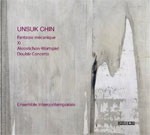Akrostichon-Wortspiel
(Acrostic-Wordplay) (1991, rev.1993)Unsuk Chin
fl*(=picc,afl).ob.cl*(=bcl)-perc(1):timp/tam-t/cyms/2tom-t(2diff sizes)/
tamb on a stand/guiro/ant.cyms/tgl/mouth harmonica/glsp/vib/SD/
sm tgl/marimba/xyl-mandolin-harp*-pft-vln*.vla.db
*these instruments should be tuned anywhere between a 4th & 6th of a
tone higher than concert pitch. Each instrument may take a
different tuning.
Abbreviations (PDF)
Boosey & Hawkes
I Hide and Seek
II The Puzzle of the Three Magic Gates
III The Rules of the Game – sdrawkcab emiT
IV Four Seasons in Five Verses
V Domifare S
VI The Game of Chance
VII From the Old Time
Akrostichon-Wortspiel (Akrostic-Wordplay), Commissioned by the Gaudeamus Foundation, was composed in 1991 for the occasion of the 1991 Gaudeamus Prizewinner’s Concert and its first performance, in incomplete form, was given by the Nieuw Ensemble in Amsterdam conducted by David Porcelijn. The piece was completed two years later and this definitive version received its premiere at the Queen Elizabeth Hall in London on 8 September 1993 with George Benjamin conducting the Premiere Ensemble.
Akrostichon-Wortspiel consists of seven scenes from the fairytales The Endless Story by Michael Ende and Alice through the Looking Glass by Lewis Carroll. The selected texts have been worked upon in different ways: sometimes the consonants and vowels have been randomly joined together, other times the words have been read backwards so that the symbolic meaning alone remains.
Each of the seven pieces is constructed around a controlling pitch centre but in their means of expression they are fully differentiated from one another. Seven different situations of emotional states, as described in the fairytales, ranging from the bright to the grotesque are brought to expression.
The tunings of some of the ensemble instruments are adapted from one quarter to one sixth of a tone to achieve a fine microtonality. The solo soprano fluctuates between these two tuning systems, depending upon which she perceives at any time.
Unsuk Chin, 1993
Reproduction Rights
This programme note can be reproduced free of charge in concert programmes with a credit to the composer

Piia Komsi, soprano / Ensemble Intercontemporain / Kazushi Ono
KAIROS 0013062KAI

